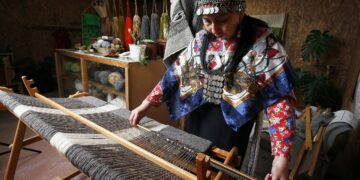On stage at a packed Chicago club on a Tuesday night in November, mariachi musician Shae Fiol tells a story. The leader of Flor de Toloache recalls a curious 16-year-old girl who reached out to her group about 7 years ago. The teen, a young mariachi herself, had heard about the all-female mariachi group from New York and was captivated. She asked if they’d let her sit in on one of their gigs. When they agreed, she drove through several states with her mother to get to their show at the Bronx Botanical Garden. They were impressed by her talent and loved her spirit, but more importantly, the teen was so energized by the experience that she returned home to start her own all-female mariachi group.
As Fiol finishes recounting the story to the audience, she turns to introduce the now 23-year-old vihuela player from Southwest Detroit, Camila Cantu.
Cantu, the founder of Michigan’s only all-female mariachi group, Mariachi Femenil, is now an accomplished musician and aspiring producer. She recently finished a 21-date tour with her childhood heroes, Flor de Toloache.
Flor de Toloache are a Grammy Award®-nominated and Latin Grammy Award®-winning all-women group known for their mariachi fusion sound. Their name translates to “flower of toloache” which is a Mexican plant used in indigenous medicine.
“I saw them and they were everything I ever wished they could’ve been,” says Cantu, recalling the first time she saw them play. “They were dope. They wore [mariachi] pants, which was amazing to me. It definitely influenced my decision to have my band in Detroit wear pants.”
Even as a teen, Cantu was able to carve out a niche for women within a historically male-dominated creative space. But then again, she’s used to being one of the few, and often the only, female in a group. From a young age, Cantu has always been fearless about music. She recalls being in band class in third grade and while all the girls were expected to play either clarinet or flute, she played the drums.
“I remember being a little girl and thinking like, ‘What is that? Why don’t they want to play a trumpet? Why don’t they want to play a drum?’” laughs Cantu. “You know, as a little girl it just blew my mind. I was like, ‘I don’t know why nobody wants to play the drum. It’s so cool, I’m the loudest one here.’”
After soundcheck for the Flor de Toloache show in Chicago, Cantu is relaxed and friendly. She smiles easily and often. If she’s nervous about performing, she hides it masterfully, but it’s unlikely. Cantu is a consummate performer. That’s no surprise. She’s been doing it since she was a child.
In her hoodie and sweatpants, the only clue to distinguish that Cantu isn’t just another of the club’s college-age patrons filing into the bar is her sparkly makeup. Although Cantu is a small-framed woman, when she steps onto the stage in a fully-sequined pantsuit and her vihuela, her presence radiates tall and strong along with the other women on stage.
In the same way that Cantu was influenced by Flor de Toloache a decade ago for being an all-female mariachi group, she’s also inspired by the way they infuse their music in a modern way, and she embraces the challenges it brings.
“We’re talking about mariachi infused with jazz rhythms or like one of the songs in our set is played with Brazilian rhythms,” says Cantu. “I’m having to learn different tempos and rhythms just to keep up with what the group is playing.”
Being invited to join Flor de Toloache for their tour this past fall was just one of a long line of accomplishments for Cantu. Although her mariachi band went on to become hugely popular and highly in demand, she is also gaining success in other areas of her music career. She’s currently working on a recording project of music that she’s written.
Cantu describes the vibe of her new music as “groovy, chill, neo-soul R&B.” The work in progress is a departure from her mariachi roots, but the echoes are still there.
“One thing I’ve noticed about my singing is that it’s very influenced by mariachi music,” says Cantu. “My singing has a lot of falsetto, or has a lot of elongated notes, which if you listen to mariachi music you hear that a lot.”
After working with Flor de Toloache, Cantu realizes that she doesn’t need to compartmentalize her music. Instead, she’s now exploring ways to bring all her experience and influences together to create new sonic textures.
“I kind of want to be a little bit of an alchemist. I want to figure out ways to incorporate traditional instruments like guitarron and vihuela into modern music,” she says. “The epiphany I had on this tour was that there are ways that I can use these sounds that are unique and haven’t been done before. I can create an entirely new sound.”
Cantu will be performing some original music from her new project at the Singers In the Round event at Otis Supply in Ferndale on Tuesday, Dec. 13. On Friday, Dec. 23 at the Marble Bar in Detroit, she’ll be playing beats she produced for a rap battle between underground artists Demaciiio and BeFree.
To learn more about Cantu and stay up to date with her upcoming projects, follow @camillacantu on Instagram.
Ofelia Saenz is a native of Southwest Detroit and a writer, marketer and food entrepreneur. She writes about entertainment, arts, culture and other human-interest stories for EL CENTRAL. Alejandro Ugalde is a Mexico City immigrant and visual storyteller with a profound love for Detroit and its multiculturalism.
Camilla Cantú, músico de mariachi de SW Detroit, se une al grupo nominado al GRAMMY para una gira nacional
En el escenario de un club de Chicago, repleto de gente un martes por la noche de noviembre, la cantante Shae Fiol cuenta una historia. La líder de la agrupación Flor de Toloache, recuerda a una jovencita de 16 años que se acercó a su grupo hace unos 10 años. La adolescente, una joven mariachi, había oído hablar del grupo de mariachis de mujeres de Nueva York y quedó cautivada. Ella preguntó si la podrían dejar participar en uno de los conciertos. Cuando el grupo estuvo de acuerdo, la chica condujo por varios estados con su madre hasta llegar al espectáculo en el Jardín Botánico del Bronx.
La agrupación quedó impresionada por su talento y les encantó su espíritu, pero lo más importante fue que la jovencita estaba tan energizada por la experiencia que regresó a casa para comenzar un grupo de mariachis femenino.
Cuando la cantante Fiol terminó de contarle la historia a la audiencia, se volvió para presentar a Camila Cantú, quien ya tiene 26 años y toca la vihuela mexicana en el suroeste de Detroit.
Cantú, la fundadora del único grupo de mariachis exclusivamente femenino de Michigan, “Mariachi Femenil”, es ahora una consumada música y aspirante a productora. Recientemente terminó una gira de 21 conciertos con sus heroínas de la infancia, “Flor de Toloache”.
Flor de Toloache es una agrupación de mujeres que ha sido nominada al premio Grammy® y ganadora del premio Grammy Latino® reconocida por su sonido de fusión con mariachi. Su nombre proviene de una planta mexicana utilizada en la medicina indígena.
“Las vi y eran todo lo que siempre deseé”, dice Cantú, recordando la primera vez que las vio cantar. “Eran fantásticas. Llevaban pantalones de mariachi, lo cual me resultó increíble. Definitivamente influyó en mi decisión de que mi banda en Detroit usara pantalones”.
Incluso para una adolescente, Cantú pudo abrir un espacio a las mujeres dentro de género creativo históricamente dominado por los hombres; debido a que ella está acostumbrada a ser una de las pocas, y usualmente la única, mujer en un grupo. Desde muy joven, Cantú siempre ha sido intrépida con la música. Ella recuerda estar en la clase de banda en tercer grado y aunque se esperaba que todas las niñas tocaran el clarinete o la flauta, ella tocaba la batería.
“Recuerdo que era una niña pequeña y pensaba: ‘¿Qué es eso? ¿Por qué no quieren tocar una trompeta? ¿Por qué no quieren tocar un tambor?’”, se ríe Cantú. “Sabes, cuando era niña eso me sorprendía. Yo estaba como, ‘No sé por qué nadie quiere tocar el tambor. Es genial, soy la más ruidosa aquí’”.
Después de la prueba de sonido para el show de Flor de Toloache en Chicago, Cantú se muestra relajada y amistosa. Ella sonríe fácilmente y con frecuencia. Si está nerviosa por actuar, lo oculta magistralmente, pero es poco probable. Cantú es una artista consumada. Eso no es sorpresa. Ella lo ha estado haciendo desde que era niña.
Con su sudadera con capucha y pantalones deportivos, la única pista para distinguir que Cantú no es solo otra de las clientas en edad universitaria del club que entra al bar, es su maquillaje brillante. Aunque Cantú es una mujer de contextura pequeña, cuando sube al escenario con su traje con pantalón de lentejuelas y su vihuela, su presencia irradia grandeza y fuerza junto con las otras mujeres en el escenario.
De la misma manera que Cantú fue influenciada por Flor de Toloache hace una década, por ser un grupo de mariachis exclusivamente femenino, también se siente inspirada por la forma en que infunden su música de una manera moderna y acepta los desafíos que eso trae consigo.
“Estamos hablando de mariachis inspirados en ritmos de jazz o como si una de las canciones de nuestro set se tocara con ritmos brasileños”, dice Cantú. “Tengo que aprender diferentes tempos y ritmos solo para mantenerme al día con lo que toca el grupo”.
Ser invitada a unirse a Flor de Toloache para su gira el otoño pasado fue solo uno, de una larga lista de logros para Cantú. Aunque su banda de mariachis llegó a ser muy popular y muy demandada, también está ganando éxito en otras áreas de su carrera musical. Actualmente está trabajando en un proyecto de grabación de música que ha escrito.
Cantú describe la vibra de su nueva música como “genial, relajado, un neo-soul R&B”. El trabajo en progreso la aleja de sus raíces como mariachi, pero los ecos todavía están ahí.
“Una cosa que he notado sobre mi canto es que está muy influenciado por la música de mariachi”, dice Cantú. “Mi canto tiene mucho falsete, o tiene muchas notas alargadas, que si escuchas música de mariachi lo escuchas mucho”.
Después de trabajar con Flor de Toloache, Cantú se da cuenta de que no necesita compartimentar su música. En cambio, ahora está explorando formas de reunir toda su experiencia e influencias para crear nuevas texturas sonoras.
“Quiero ser un poco alquimista. Quiero descubrir formas de incorporar instrumentos tradicionales como el guitarrón y la vihuela a la música moderna”, dice. “La epifanía que tuve en esta gira fue que hay formas en las que puedo usar estos sonidos que son únicos y no se han hecho antes. Puedo crear un sonido completamente nuevo”.
Cantú interpretará música original de su nuevo proyecto en el evento “Singers In the Round” en Otis Supply en Ferndale el martes 13 de diciembre. El viernes 23 de diciembre en el Marble Bar en Detroit tocará ritmos que ha producido para una batalla de rap entre los artistas underground Demaciiio y BeFree.
Para obtener más información y mantenerse actualizado sobre los próximos proyectos de Cantú, siga a @camillacantu en Instagram.
Ofelia Saenz es nativa del suroeste de Detroit y escritora, vendedora y empresaria de alimentos. Escribe sobre entretenimiento, arte, cultura y otras historias de interés humano para EL CENTRAL.
Alejandro Ugalde es un inmigrante de la Ciudad de México y narrador visual con un profundo amor por Detroit y su multiculturalidad.
Traducción por Carmen Luna










































